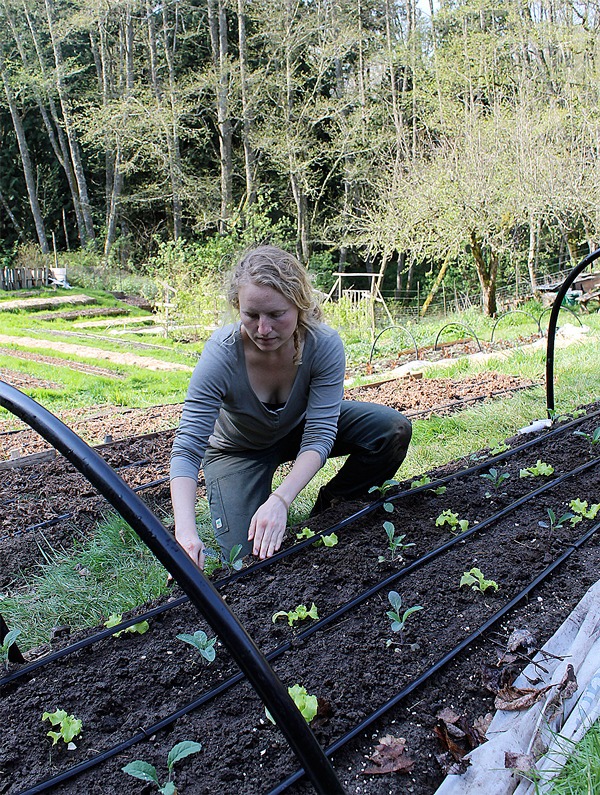Though Earth Day lasts only 24 hours, a number of South End residents are working year-round to conserve the island’s numerous natural treasures.
Many of these individuals are volunteers who assist in community gardens such as those at the school district and Good Cheer, or join in work parties removing Scotch broom and yellow archangel from public areas like South Whidbey State Park or the Saratoga Woods.
Others work with organizations such as the Whidbey Institute, fostering discussion of environmentally conscious practices within the context of building a cooperative and healthful community.
During April, these individuals and organizations will join together for Whidbey Earth and Ocean Month, a month-long celebration of the planet with activities and events ranging from an educational display at the Bayview Cash Store to the Welcome the Whales and Earth Day festivals and expert presentations and discussions at various venues.
The Whidbey Earth and Ocean Month Committee consists of representatives from Citizens Climate Lobby — Whidbey Chapter; Goosefoot; Greenbank Farm; Service, Education and Adventure (SEA); South Whidbey Tilth; and Whidbey ECO Network.
Numerous other organizations, including the Whidbey Institute, Whidbey Camano Land Trust, Whidbey Watershed Stewards, Orca Network, Pacific Rim Institute and Unitarian Universalist Church are also involved in activities throughout the month.
For Whidbey Camano Land Trust outreach manager Janelle Castro, Whidbey Earth and Ocean Month is an ideal avenue for fostering discussion about environmental issues and appreciation within the greater Whidbey community.
“I think it’s a great way to reach all types of audiences,” Castro said. “It helps raise awareness so people can take action.”

The Land Trust will host several work parties, including Scotch broom removal events at Double Bluff Beach and Saratoga Woods as well as a campground cleanup at South Whidbey State Park in coordination with the Friends of South Whidbey State Park.
Representatives from the Land Trust will also be present for South Whidbey High School’s Earth Day celebration on April 22. Both Castro and Ida Gianopulos, conservation associate, noted that events like that at the high school are helpful in developing students’ conservation ethic from an early age.
Robert Mellinger, land care coordinator at Whidbey Institute, will also be present at the high school. Mellinger plans to demonstrate a variety of “citizen science apps” which students and adults can use to learn on the go.
Mellinger tends to the land at Chinook, the 100 acres of woodland and late-19th century farmstead upon which the Whidbey Institute is located.
Gardeners at the institute will harvest produce from the land to use in producing dishes for a vegan potluck from 1-3 p.m. April 22.
“They’re opportunities for the community to come together and learn to love the place where they are, together, beyond whatever personal relationship they might have with the place,” said Mellinger of the Earth Day events.
Abigail Lazarowski, steward of the institute’s Westgarden and community garden leadership training co-coordinator, echoed Mellinger’s sentiment. Though ecological considerations should be a part of our decision-making on a daily basis, she said, events such as Earth Day help to being the topic to the forefront of community conversations.
Rick Baker, executive director of Whidbey Watershed Stewards (WWS) said that WWS will also be taking part in furthering the conversation.
Baker said that the stewards will be hosting Wetland Wednesdays once a month at the Freeland Wetland Preserve as a part of their new objective to utilize the property for educational purposes.
“Whidbey Watershed Stewards is a small organization, but we have big dreams,” said Baker.
The kickoff party and first Wetland Wednesday will take place from noon-3 p.m. April 22 at the Freeland Wetlands. The Wednesday gatherings will continue through September and will include talks from experts about subjects such as wetland hydrology and birding.
The Watershed Stewards are also involved in educational activities with the South Whidbey School District, including hands-on studies in oceanography with Langley Middle School students and frequent outings to the district’s outdoor classroom.
Lori O’Brien, Whidbey Watershed Stewards education director, said the students are “little messengers” who are enthused to share their new findings with parents and others.
O’Brien, Lazarowski, Castro, Gianopulos, Mellinger and Baker each have differing perspectives as to what is the current greatest threat to Whidbey’s natural environment. But most seemed to agree that some of the most pertinent means of day-to-day ecological preservation are planting native plant species and being mindful of carbon emissions, pollution and the effects of residential and commercial development.
“There are so many different ways you can be involved,” said Castro. “The only way we can continue to do this work is through community support.”
For more information on Whidbey Earth and Ocean Month, visit whidbeyearthday.org.


